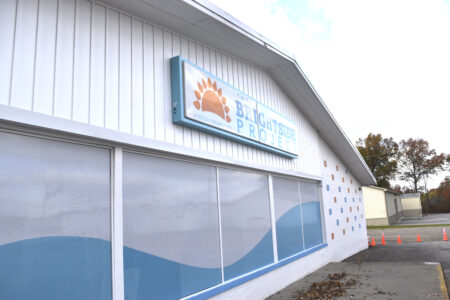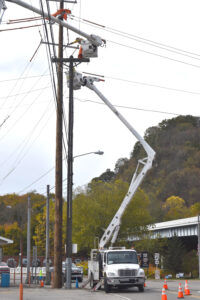Residents still waiting for compensation one year after approval
EAST PALESTINE — Today marks 11 months since a federal judge signed off on the $600 million class action settlement between Norfolk Southern and residents who lived or worked within 20 miles of the 2023 East Palestine train derailment.
Nearly a year after final approval was granted and over two and half years after the rail disaster, most residents still await any compensation from the settlement which class counsel lauded as a speedy resolution.
That resolution is currently at a standstill.
Direct payments of up to $70,000 per household – compensation for property damage from chemicals spilled and the vent-and-burn of vinyl chloride days after 38 cars derailed along East Taggart Street in the village– are paused indefinitely while the settlement remains under appeal by five residents and one law firm that helped broker the deal.
As for the personal injury payments — up to $25,000 per person who lived or worked within 10 miles of the derailment — they too are on hold as Epiq, the new settlement administrator responsible for determining claims and distributing funds, is yet to resume that process. So far, no concrete date has been announced as to when payments will restart.
Epiq replaced Kroll as the settlement administrator on June 11 when Youngstown District Court Judge Benita Pearson ordered Kroll off the case at the request of class co-counsel who charged that Kroll had fumbled determination and distribution of claims by overpaying some class members. Pearson’s ruling ordered Kroll to transfer all available data, administration-related materials and case reports to Epiq as well as access to the settlement fund established by Kroll at Huntington Bank. She also ordered a third-party audit of Kroll’s performance and conduct. That audit was expected to take 60 days and to be submitted to the court when completed.
In July, Epiq reported it was “hopeful” that personal injury payments, open to individuals who lived and worked within 10 miles of the derailment, would begin again “by early fall.”
In its latest update posted to eastpalestinederailmentsettlement.com — the website created to keep class members informed of payment progress — Epiq pushed back that anticipated timeline, using ambiguous language that leaves things up in the air.
“Epiq has received all data from Kroll and is currently reviewing all claims that were denied by the former administrator, which will take time,” the post read. “We are doing our very best to do this right and do this fast to potentially resume payments in mid-fall.”
Days after Kroll was removed as the settlement administrator, a batch of letters denying personal injury claims was delivered to class members – including first responders who battled the chemical fires that erupted when the cars careened off track.
Most of the denials were sent to claimants who filed a claim for having worked in or around East Palestine without residing there, but village residents were denied too, including one who has lived at the same address for over 30 years. Others were denied on the basis that they did not respond to letters notifying residents of deficiencies in their claims — letters residents say they never received.
From the very beginning of the personal injury distribution process, residents reported problems. Those who filled out paperwork at one of two claim centers set up in East Palestine had to make multiple visits back to the centers to fill out what Kroll said was incomplete or missing paperwork. Others were told Kroll had no record of their claims being filed at all.
As for class counsel’s assertion that Kroll had overpaid claims, residents said the opposite was true and provided the Morning Journal with determination letters with amounts as low as $200 for personal injury damages.
Perhaps most frustrating for residents still waiting for any payment was the promise that checks or direct deposits would be made within 30 days of final approval. That promise was made during a zoom meeting last summer held by lead co-counsels Seth Katz, Elizabeth Graham, Adam Gomez and Michelle Kranz to drum up support for the settlement as the Aug. 22, 2024 deadline to opt in approached. The attorneys guaranteed personal payments by the end of that year due to what they called a “timely payment provision that ensures claimants receive their settlement money within 30 days regardless of whether or not appeals in the courts go on for longer.” Based on that promise, personal injury payments are now over 300 days behind schedule.
When it became clear that the payment process was becoming painfully protracted, attorneys and Kroll reversed course, insisting that personal injury payments were to only “begin within 30 days of final approval.” Still, six months after final approval, Kroll reported just 1,800 payments — or roughly 450 a month — had been completed, accounting for just a fraction of the personal injury claims made.
When removed as administrator, Kroll had already billed class counsel over $2 million for services and had anticipated billing up to $14.6 million more. What Epiq will receive or has already received for its services has yet to be made public.
What has been made public is the legal fees awarded — $180 million to the attorneys who brokered the deal to split among their firms – which was paid out less than two weeks after final approval. After legal fees were deducted from the $600 settlement, $410 million was left to settle the more than 55,000 claims made including $120 million earmarked for personal injury damages.
Appeals regarding the direct payments are ongoing. Oral arguments have been set for Oct. 25 in Cincinnati’s Sixth District Court for action brought by Morgan & Morgan that questioned the way legal fees were divided and took issue with the quick-pay provision that allowed attorneys to be paid while residents were forced to wait.
The fate of the appeals from five residents, which was consolidated into one case that disputes the settlement itself, is still in limbo as the Sixth Circuit considers a motion to reduce or eliminate the $850,000 appeal bond Pearson ordered in January. That bond is to be split between Rev. Joseph Sheely, Zsuzsa Troyan, Tamara Freeze, Sharon Lynch and Carly Tunno who believe the settlement did not provide enough money for medical bills and medical treatment for illnesses blamed on the derailment and alleged the class members were provided false and misleading information, expert testimony was ignored during negotiations and not enough time given to class members to decide whether to opt in or out.
The attorney representing the appealing residents requested oral arguments but that motion too remains under consideration in the Sixth Circuit.
Some of the residents waiting on both direct and personal injury payments have lashed out at the appealing class members who they blame for halting the direct payments. Social media pages set up for residents to share updates regarding payments are filled with comments that accuse Sheely, Troyan, Freeze, Lynch and Tunno of being selfish. The administrator of one such site has gone as far as to suggest legal action against those who appealed as division among residents impacted by the derailment continues to deepen.
“If the appeals have affected you with any of the below symptoms or issues then you have been legally bullied whether you realize it or not,” she wrote. “People have a legal right to appeal if they have legal standing to file the appeal. If you do not have legal standing it is harassment, bullying etc. and can lead to a lawsuit.”
Others say that anger is misplaced and defend the five residents’ right to appeal the settlement. They instead chose to place the blame on Norfolk Southern and the attorneys who celebrated and pushed for both households and individuals impacted by the derailment to opt in to the settlement.
“You all are getting angry at the wrong people,” one poster commented. “But if they [the appellants] won their appeal and got more money everybody would be so happy, huh? You still got your check but on top of that after they won their case you’d get a little more. Put blame where the blame is due on the class action attorneys.”
The lawyers themselves have also pointed fingers at the appealing residents, calling the appeals “tragic” and “deeply disappointing” in a joint statement when the first appeal was filed days after final approval of the settlement was granted. The statement also said the appeals would “prevent swift payments” for “the residents and local businesses that want to move forward and rebuild their lives.”
But those payments, appeal or no appeal, proved to be anything but swift. While the appeals have indeed delayed direct payments, they had no impact on Kroll’s inability to process the personal injury claims — which are dwarfed by claims for property damage — in a timely manner.
That has led some residents to deduce the appeals are not the problem while recognizing the legitimacy of everyone’s point of view.”
” I understand why people appealed it. I wish I could have,” another poster wrote. “And I understand why people want their money as soon as possible, but neither is right or wrong.”
Conflicting feelings aside, the waiting has taken its toll as some residents believe the payments will come too late to matter.
“I imagine I’ll be dead before I see anything,” one posted. “What upsets me is I know families with small children that would love to get out of there and simply can’t until this is resolved.”
“Once again we are being asked to be patient. How many years do we have to be patient before things are done so we can go on with our lives?” another posted. “Our lives have been on hold for 2 1/2 years now.”


